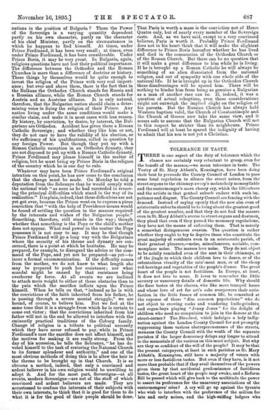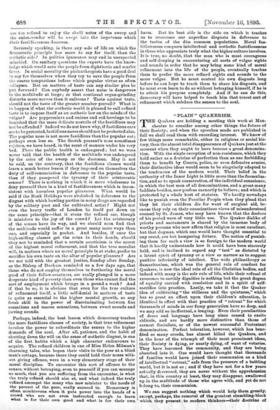TOLERANCE IN TASTE. T HERE is one aspect of the duty
of tolerance which the classes are certainly very reluctant to grasp, even for the benefit of the masses,—we mean tolerance in taste. The Vestry of St. Mary Abbott's, Kensington, have been doing their best to persuade the County Council of London to pass some local regulation to silence the street noises, from the street-organs to the chimney-sweep's melancholy monosyllable and the costermonger's more cheery cry, which the litterateurt and the artists in that genteel suburb endure with such im_ patience and disgust. The County Council are fencing with the demand. Instead of saying openly that the new aim even of aristocratic suburbs should be to bring about the greatest good of the greatest number, and that they do not find the masses even in St. Mary Abbott's averse to street-organs and dustmen. they plead that even if they passed the necessary regulations, they have not the means of enforcing them. That is merely a somewhat disingenuous evasion. The question is rather whether they ought to try to deprive those who constitute the great majority of residents even in an aristocratic parish, of their greatest pleasure,—noise, miscellaneous, sociable, com- monplace noise. The masses love noise. They do not object to be noisily reminded even of the soot in their chimneys, or of the jingle to which their children love to dance, or of the ostentatious vivacity of the cats'-meat man, or of the cheap red-herrings and vegetables of the people's dinner. The great heart of the people is not fastidious. In Europe, at least, it does not love to muse. It loves to remember the little savoury or unsavoury details of domestic life. Why should the finer tastes of the classes, who like more tranquil hours and whose love of art for art's sake overpowers their satis- faction in the little fusses of common life, be consulted at the expense of those "dim common populations" who do not object to crowing cocks and wandering knife-grinders, and organ-boys playing "Jenny Jones" for the delight of children who need no compulsion to join in the dances at the street-corner? The Standard, which indulges a holy indig- nation against the London County Council for not promptly suppressing these various obstreperonsnesses of the streets, menaces the County Council with the wrath of the separate parishes if the larger democracy delays any longer to attend to the memorials of the vestries on this moot subject. But why are they so confident of the will of the people? It may be thafi. the present ratepayers, at least in such parishes as St. Mary Abbott's, Kensington, still have a majority of voters with more or less fastidious tastes. But even if they have, is it not more than probable that if they avail themselves of the powers given them by that accidental predominance of fastidious tastes, the great heart of the people may awake, and a Reform Bill be passed which will give back to the multitude the power to assert its preference for the unsavoury associations of the costermongers' cries? A cry will go up against the tyrants. who wish to interfere with the preference of the million for late and early noises, and the high-sniffing lodgers who are too refined to enj,-by the shrill notes of the sweep and the onion-vendor will be swept into the impotence which -their fastidiousness deserves.
Seriously speaking, is there any side of life on which the democratic principle has more to say for itself, than the mithetic side ? In politics ignorance may end in unexpected mischief. On sanitary questions the experts have the know- ledge which would save the people from diphtheria and scarlet fever. In social morality the philanthropists have a good deal to say for themselves when they try to save the people from the coarse temptations before which popular virtue so often collapses. But on matters of taste can any similar plea be put forward ? Can anybody assert that noise is dangerous to the multitude at large ; or that continual organ-grinding disturbs more nerves than it enlivens P Taste against taste, should not the taste of the greater number prevail ? What is to happen if what the testhetic world is pleased to call refined taste is to impose itself as an amthetic law on the minds of the vulgar? Are peppermints and onions and red-herrings to be banished that the more delicate nostrils of the fastidious may not be offended ? Indeed we do not know why, if fastidious ears are to be protected, fastidious noses should not be protected also. The popular nose is not more fastidious than the popular ear; perhaps even less so. The Scotch peasant's nose sometimes rejoices, we have heard, in the scent of manure under his very bed. There the public health is endangered ; but we were never told that the health of the multitude was endangered by the cries of the sweep or the dustman. May it not be said, on the contrary, that the fastidious classes would 4earn a much better lesson if they imposed on themselves the ,duty of self-renunciation in deference to the popular taste, than if they pampered the tyranny of their aristocratic senses ? There is nothing in which it is more wholesome to deny yourself than in a kind of fastidiousness which is incon- sistent with harmless popular pleasures. What would be said if the Bank Holidays were abolished in deference to the disgust with which bawling parties in noisy drags are regarded by the solitary poet and the cultivated artist ? Might not even the heavy traffic of London be itself put down on the same principle—that it stuns the refined ear, though it ministers to the joy of the crowd? Let the aristocracy of the senses have its way, and we should soon find that the multitude would suffer in a great many more ways than one, and especially in pocket. And besides, if once the high-sniffing classes get the reins in their hands, should they not be reminded that a certain asceticism is the secret of the highest moral refinement, and that the true moralist
in matters where no moral principle is at stake, prefer to sacrifice his own taste on the altar of popular pleasure ? Are we not told with the greatest justice, Sunday after Sunday, as the Bishop of Durham reminded us a few days ago, that those who do not employ themselves in furthering the moral good of their fellow-creatures, are really plunged in a more desperate kind of poverty than even those who cannot find the -sort of employment which brings in a pound a week ? And if that be so, it is obvious that even for the true culture of refinement itself, a little self-denial in matters of taste is quite as essential to the higher mental growth, as any fresh skill in the power of discriminating between fine sensations and coarse sensations, between sweet sounds and jarring sounds.
Perhaps, indeed, the best lesson which democracy teaches the more fastidious classes of society, is that true refinement involves the power to subordinate the senses to the higher demands of the soul. After all, patience, and the habit of shutting down the will on the sense of a3sthetic disgust, is one .of the first habits which a high character endeavours to acquire. The refined children in one of Miss Helen Milman's charming tales, who began their visits to the poor at a blind man's cottage, because there they could hold their noses with- out giving offence, were in a very elementary stage of their moral discipline. To encounter this sort of offence to the senses, without betraying, even to yourself if you can manage 40 much, that you are suffering from the encounter, is what the truly refined should aim at, and what indeed the truly refined amongst the many who now minister to the needs of the poorest of the poor, really succeed in. Democracy is often mischievous when it puts power into the hands of a crowd who are not even instructed enough to learn what is for their own good and what is for their own
harm. But its best side is the side on which it teaches us to overcome our superfine disgusts in deference to the tastes of the dim common populations. Moral fas- tidiousness conquers intellectual and anthetio fastidiousness in those who appreciate truly what the higher culture involves. It is true, no doubt, that the man who is most courageous and self-denying in encountering all sorts of vulgar sights and Bounds in order that he may bring some kind of moral refinement into the life of the people, eventually teaches them to prefer the more refined sights and sounds to the more vulgar. But he must control his own disgusts long before he can hope to teach them to share his disgusts, and he must even learn to do so without betraying himself, if he is to attain his purpose completely. And if he can do this, democracy will have helped to teach him that truest sort of refinement which subdues the senses to the soul. "



















































 Previous page
Previous page